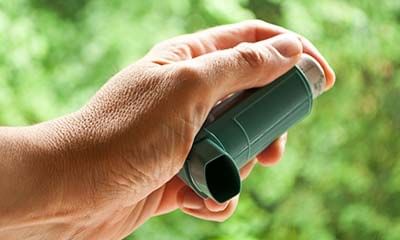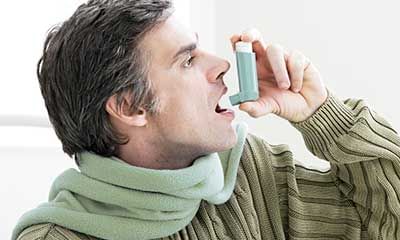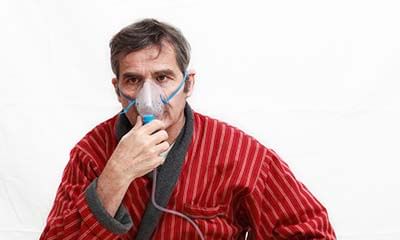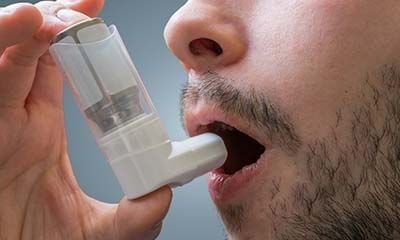Can A Person Live Without Lungs
If person had dementia and care taker did not get treated for years will this shorten life? ...
Ask Free Question
No one knows exactly how much life we are going to live so there is no particular way to say whether a particular person's life is shortened because of a particular event in life. For example, some say smoking reduces life by causing lung cancer, wherein there are plenty such cases where nonsmokers died because of it and smokers lived longer. The data that we see only finds averages and means but has no absolute way of making a sure-shot statement. The day starts with you waking up. So whenever the caretaker realizes that the cared has dementia, he/she should help her with the treatment by looking forward and not backward. Take care :)
Is it safe to have sex with a person (who recovered from corona) after 30 days of recovery, without protection? ...
Ask Free Question
Hello Corona is still a mystery. Some upcoming researches suggest that the virus may live up to 180 day inside the body. So better to abstain as much as you can.
I have problem of breathlessness I take inhaler rotacaps! can I overcome this problem? Or this would remain life long? ...
Ask Free Question
Asthma has become a common ailment these days because of rampant air pollution and stressful lifestyle. The quality of the air we breathe, the change in climate and dust allergy can easily bring in an asthmatic flare-up in some people. An asthma attack causes breathing difficulty. This happens as your bronchial tubes get inflamed and contract, thereby narrowing down the air passages. You feel your chest tightening up and experience shortness of breath with a wheezing sound. What triggers asthma flare-ups? There a number of potential triggers for mild to severe asthmatic attacks. By identifying and avoiding these triggering factors you can bring down the frequency of your asthmatic flare-ups notably. Look out for the following factors that may set off asthma: 1.Cold and flu: cold and flu infection spreads through coughing and sneezing from an infected person. A cold takes 2-4 days while flu takes 3-4 weeks to recover. These infections can potentially trigger the asthma attack by causing inflammation of the air passages. 2.Weather change: the changing weather conditions, cold air, humid climate and thunderstorms often trigger asthma flare-ups. Changes in temperature also aggravate asthma problem. Cold air is one of the most common reasons for asthma attacks in kids and adults alike. 3.Allergens: dust mites: dust mites in your carpets, rugs, pillows and bedding may trigger asthma as well. It is very difficult to kill dust mites. Make sure you use the vacuum cleaner to clear away dust from your beddings, carpets, pillows etc. And put them out in the sun often. Moulds: if you have indoor plants then they may trigger an asthma attack due to allergy flare-ups. This happens as they tend to form moulds that may trigger asthma. Pollens: indoor plants and garden areas may be a good thriving ground for pollens. Pollens are very fine particles. Insects and gusts of air may transport these allergens to your body through breath. Pet/animal dander and cockroaches: pets or animals with hair or furs like a dog, cat, bird or even mice may shed minuscule skin flecks that may cause irritation and trigger an asthmatic flare up. If you have cockroaches at home, then get pest control done. Their droppings may also trigger asthma flare up and you would have never guessed the real reason! 4.Work environment: if your office area is closed up and not well ventilated, has wood dust or smell of wood polish, wall paint fumes, chemicals etc. Then your asthma flare-up can set off easily. 5.Cigarette smoke: if you smoke or you are in a smoking zone like in a restaurant or a party, then the smoke can prompt an asthma flare-up. Even smoke from a bushfire may trigger it. 6. Air pollution: if you live, work or travel in an area where air pollution is high due to traffic or lack of greenery, then an asthma flare-up can occur frequently. 7.Strong smells: strong smells from flowers, mosquito repellents, incense sticks, varnish, paint, perfumed candles, deodorants or body perfumes can also trigger asthma. 8.Medication: certain medicines can also trigger asthma attack like blood pressure or steroidal medicines etc. Always ask your doctor before taking medicines. 9.Stress and emotional highs: if you have not taken a vacation in a long time, you are working late nights or have to do heavy physical or mental work, then it results in extreme stress. It may trigger an asthmatic flare up. Emotional highs like anger or excitement can also trigger a flare-up of asthma. 10.Exercise: exercising, jogging, swimming or running can also trigger asthmatic attack due to physical exertion. This happens because when you run or work out, then breathing becomes faster. This lets a lot of cold air enter your lungs in comparison to normal breath that is made warm by your nose. 11.Hormonal imbalance: anytime you are experiencing hormonal ups and downs, asthma flare-up can get triggered. For women menstrual cycle, pregnancy or menopause can trigger asthma in some cases. This is not very common though. 11.Foods: kapha aggravating foods can also trigger an asthmatic attack. Avoid rice, curd, high salt, sugar, lentils, strong tea, alcohol, pickles, sauces, processed foods to lower the risk of an asthma flare-up. Processed foods contain preservatives like sulphite foods that may trigger asthma. Find out the reasons that cause your asthma to flare up. Keep yourself active despite asthma by avoiding these triggering factors.
Sir my mother have asthma problem in five months I want to know that how many time it take to good for permanently. ...
Ask Free Question
Asthma has become a common ailment these days because of rampant air pollution and stressful lifestyle. The quality of the air we breathe, the change in climate and dust allergy can easily bring in an asthmatic flare up in some people. An asthma attack causes breathing difficulty. This happens as your bronchial tubes get inflamed and contract, thereby narrowing down the air passages. You feel your chest tightening up and experience shortness of breath with a wheezing sound. What triggers asthma flare-ups? There a number of potential triggers for mild to severe asthmatic attacks. By identifying and avoiding these triggering factors you can bring down the frequency of your asthmatic flare-ups notably. Look out for the following factors that may set off asthma: 1.Cold and flu: cold and flu infection spreads through coughing and sneezing from an infected person. A cold takes 2-4 days while flu takes 3-4 weeks to recover. These infections can potentially trigger the asthma attack by causing inflammation of the air passages. 2.Weather change: the changing weather conditions, cold air, humid climate and thunderstorms often trigger asthma flare-ups. Changes in temperature also aggravate asthma problem. Cold air is one of the most common reasons for asthma attacks in kids and adults alike. 3.Allergens: dust mites: dust mites in your carpets, rugs, pillows and bedding may trigger asthma as well. It is very difficult to kill dust mites. Make sure you use the vacuum cleaner to clear away dust from your beddings, carpets, pillows etc. And put them out in the sun often. Moulds: if you have indoor plants then they may trigger an asthma attack due to allergy flare-ups. This happens as they tend to form moulds that may trigger asthma. Pollens: indoor plants and garden areas may be a good thriving ground for pollens. Pollens are very fine particles. Insects and gusts of air may transport these allergens to your body through breath. Pet/animal dander and cockroaches: pets or animals with hair or furs like a dog, cat, bird or even mice may shed minuscule skin flecks that may cause irritation and trigger an asthmatic flare up. If you have cockroaches at home, then get pest control done. Their droppings may also trigger asthma flare up and you would have never guessed the real reason! 4.Work environment: if your office area is closed up and not well ventilated, has wood dust or smell of wood polish, wall paint fumes, chemicals etc. Then your asthma flare-up can set off easily. 5.Cigarette smoke: if you smoke or you are in a smoking zone like in a restaurant or a party, then the smoke can prompt an asthma flare-up. Even smoke from a bushfire may trigger it. 6. Air pollution: if you live, work or travel in an area where air pollution is high due to traffic or lack of greenery, then an asthma flare-up can occur frequently. 7.Strong smells: strong smells from flowers, mosquito repellents, incense sticks, varnish, paint, perfumed candles, deodorants or body perfumes can also trigger asthma. 8.Medication: certain medicines can also trigger asthma attack like blood pressure or steroidal medicines etc. Always ask your doctor before taking medicines. 9.Stress and emotional highs: if you have not taken a vacation in a long time, you are working late nights or have to do heavy physical or mental work, then it results in extreme stress. It may trigger an asthmatic flare up. Emotional highs like anger or excitement can also trigger a flare-up of asthma. 10.Exercise: exercising, jogging, swimming or running can also trigger asthmatic attack due to physical exertion. This happens because when you run or work out, then breathing becomes faster. This lets a lot of cold air enter your lungs in comparison to normal breath that is made warm by your nose. 11.Hormonal imbalance: anytime you are experiencing hormonal ups and downs, asthma flare-up can get triggered. For women menstrual cycle, pregnancy or menopause can trigger asthma in some cases. This is not very common though. 11.Foods: kapha aggravating foods can also trigger an asthmatic attack. Avoid rice, curd, high salt, sugar, lentils, strong tea, alcohol, pickles, sauces, processed foods to lower the risk of an asthma flare-up. Processed foods contain preservatives like sulphite foods that may trigger asthma. Find out the reasons that cause your asthma to flare up. Keep yourself active despite asthma by avoiding these triggering factors.
I am 24 years old female. I have asthmatic problem. Please tell me about this treatment price? ...
Ask Free Question
Asthma has become a common ailment these days because of rampant air pollution and stressful lifestyle. The quality of the air we breathe, the change in climate and dust allergy can easily bring in an asthmatic flare up in some people. An asthma attack causes breathing difficulty. This happens as your bronchial tubes get inflamed and contract, thereby narrowing down the air passages. You feel your chest tightening up and experience shortness of breath with a wheezing sound. What triggers asthma flare-ups? There a number of potential triggers for mild to severe asthmatic attacks. By identifying and avoiding these triggering factors you can bring down the frequency of your asthmatic flare-ups notably. Look out for the following factors that may set off asthma: 1.Cold and flu: cold and flu infection spreads through coughing and sneezing from an infected person. A cold takes 2-4 days while flu takes 3-4 weeks to recover. These infections can potentially trigger the asthma attack by causing inflammation of the air passages. 2.Weather change: the changing weather conditions, cold air, humid climate and thunderstorms often trigger asthma flare-ups. Changes in temperature also aggravate asthma problem. Cold air is one of the most common reasons for asthma attacks in kids and adults alike. 3.Allergens: dust mites: dust mites in your carpets, rugs, pillows and bedding may trigger asthma as well. It is very difficult to kill dust mites. Make sure you use the vacuum cleaner to clear away dust from your beddings, carpets, pillows etc. And put them out in the sun often. Moulds: if you have indoor plants then they may trigger an asthma attack due to allergy flare-ups. This happens as they tend to form moulds that may trigger asthma. Pollens: indoor plants and garden areas may be a good thriving ground for pollens. Pollens are very fine particles. Insects and gusts of air may transport these allergens to your body through breath. Pet/animal dander and cockroaches: pets or animals with hair or furs like a dog, cat, bird or even mice may shed minuscule skin flecks that may cause irritation and trigger an asthmatic flare up. If you have cockroaches at home, then get pest control done. Their droppings may also trigger asthma flare up and you would have never guessed the real reason! 4.Work environment: if your office area is closed up and not well ventilated, has wood dust or smell of wood polish, wall paint fumes, chemicals etc. Then your asthma flare-up can set off easily. 5.Cigarette smoke: if you smoke or you are in a smoking zone like in a restaurant or a party, then the smoke can prompt an asthma flare-up. Even smoke from a bushfire may trigger it. 6. Air pollution: if you live, work or travel in an area where air pollution is high due to traffic or lack of greenery, then an asthma flare-up can occur frequently. 7.Strong smells: strong smells from flowers, mosquito repellents, incense sticks, varnish, paint, perfumed candles, deodorants or body perfumes can also trigger asthma. 8.Medication: certain medicines can also trigger asthma attack like blood pressure or steroidal medicines etc. Always ask your doctor before taking medicines. 9.Stress and emotional highs: if you have not taken a vacation in a long time, you are working late nights or have to do heavy physical or mental work, then it results in extreme stress. It may trigger an asthmatic flare up. Emotional highs like anger or excitement can also trigger a flare-up of asthma. 10.Exercise: exercising, jogging, swimming or running can also trigger asthmatic attack due to physical exertion. This happens because when you run or work out, then breathing becomes faster. This lets a lot of cold air enter your lungs in comparison to normal breath that is made warm by your nose. 11.Hormonal imbalance: anytime you are experiencing hormonal ups and downs, asthma flare-up can get triggered. For women menstrual cycle, pregnancy or menopause can trigger asthma in some cases. This is not very common though. 11.Foods: kapha aggravating foods can also trigger an asthmatic attack. Avoid rice, curd, high salt, sugar, lentils, strong tea, alcohol, pickles, sauces, processed foods to lower the risk of an asthma flare-up. Processed foods contain preservatives like sulphite foods that may trigger asthma. Find out the reasons that cause your asthma to flare up. Keep yourself active despite asthma by avoiding these triggering factors.
My husband is 32 years old. He has mild chest pain since 1 week. He got checkup and his bp is normal. But mild chest pai ...
Ask Free Question
Chest pain or discomfort can be due to pain originating from heart ,stomach, lungs ,bones, muscles,stress, vitamin and mineral deficiencies .you may have either one or multiple causes for your chest pain which needs to be properly evaluated. General advice does not work because the triggers for the chest pain varies from person to person. Your Dr. medicates you which will only control and never cure the disease. He never educates you which is what you need to cure I am the only doctor in Lybrate trained abroad in lifestyle medicine who treats patients globally with diet and lifestyle changes food and mineral supplements alone without any medicines get educated through me and get rid of your disease. You cannot treat what you cannot see. You will never know what you are missing in your proper disease management unless you talk to me through a consultation through Lybrate. Get the right guidance from me. If you want to have a temporary fix stay with your current doctor and live with your disease if you want a permanent fix come to me. Get a proper and detailed history taken, do the right tests focused on the root cause and not based on the symptom or disease and get an individualized diet plan from me with my own recipes which creates optimal wellness the choice is yours.
I have asthma problem since childhood so many time I am going in dangerous zone. I have lots of medicine but yet not goo ...
Ask Free Question
Asthma has become a common ailment these days because of rampant air pollution and stressful lifestyle. The quality of the air we breathe, the change in climate and dust allergy can easily bring in an asthmatic flare up in some people. An asthma attack causes breathing difficulty. This happens as your bronchial tubes get inflamed and contract, thereby narrowing down the air passages. You feel your chest tightening up and experience shortness of breath with a wheezing sound. What triggers asthma flare-ups? There a number of potential triggers for mild to severe asthmatic attacks. By identifying and avoiding these triggering factors you can bring down the frequency of your asthmatic flare-ups notably. Look out for the following factors that may set off asthma: 1.Cold and flu: cold and flu infection spreads through coughing and sneezing from an infected person. A cold takes 2-4 days while flu takes 3-4 weeks to recover. These infections can potentially trigger the asthma attack by causing inflammation of the air passages. 2.Weather change: the changing weather conditions, cold air, humid climate and thunderstorms often trigger asthma flare-ups. Changes in temperature also aggravate asthma problem. Cold air is one of the most common reasons for asthma attacks in kids and adults alike. 3.Allergens: dust mites: dust mites in your carpets, rugs, pillows and bedding may trigger asthma as well. It is very difficult to kill dust mites. Make sure you use the vacuum cleaner to clear away dust from your beddings, carpets, pillows etc. And put them out in the sun often. Moulds: if you have indoor plants then they may trigger an asthma attack due to allergy flare-ups. This happens as they tend to form moulds that may trigger asthma. Pollens: indoor plants and garden areas may be a good thriving ground for pollens. Pollens are very fine particles. Insects and gusts of air may transport these allergens to your body through breath. Pet/animal dander and cockroaches: pets or animals with hair or furs like a dog, cat, bird or even mice may shed minuscule skin flecks that may cause irritation and trigger an asthmatic flare up. If you have cockroaches at home, then get pest control done. Their droppings may also trigger asthma flare up and you would have never guessed the real reason! 4.Work environment: if your office area is closed up and not well ventilated, has wood dust or smell of wood polish, wall paint fumes, chemicals etc. Then your asthma flare-up can set off easily. 5.Cigarette smoke: if you smoke or you are in a smoking zone like in a restaurant or a party, then the smoke can prompt an asthma flare-up. Even smoke from a bushfire may trigger it. 6. Air pollution: if you live, work or travel in an area where air pollution is high due to traffic or lack of greenery, then an asthma flare-up can occur frequently. 7.Strong smells: strong smells from flowers, mosquito repellents, incense sticks, varnish, paint, perfumed candles, deodorants or body perfumes can also trigger asthma. 8.Medication: certain medicines can also trigger asthma attack like blood pressure or steroidal medicines etc. Always ask your doctor before taking medicines. 9.Stress and emotional highs: if you have not taken a vacation in a long time, you are working late nights or have to do heavy physical or mental work, then it results in extreme stress. It may trigger an asthmatic flare up. Emotional highs like anger or excitement can also trigger a flare-up of asthma. 10.Exercise: exercising, jogging, swimming or running can also trigger asthmatic attack due to physical exertion. This happens because when you run or work out, then breathing becomes faster. This lets a lot of cold air enter your lungs in comparison to normal breath that is made warm by your nose. 11.Hormonal imbalance: anytime you are experiencing hormonal ups and downs, asthma flare-up can get triggered. For women menstrual cycle, pregnancy or menopause can trigger asthma in some cases. This is not very common though. 11.Foods: kapha aggravating foods can also trigger an asthmatic attack. Avoid rice, curd, high salt, sugar, lentils, strong tea, alcohol, pickles, sauces, processed foods to lower the risk of an asthma flare-up. Processed foods contain preservatives like sulphite foods that may trigger asthma. Find out the reasons that cause your asthma to flare up. Keep yourself active despite asthma by avoiding these triggering factors.
Doc, meri future hone wali wife se Shaadi hone wali hai aur unko asthma problem hai tho kya unhe aagr jakar kuch problem ...
Ask Free Question
Asthma has become a common ailment these days because of rampant air pollution and stressful lifestyle. The quality of the air we breathe, the change in climate and dust allergy can easily bring in an asthmatic flare up in some people. Asthma attack causes breathing difficulty. This happens as your bronchial tubes get inflamed and contract, thereby narrowing down the air passages. You feel your chest tightening up and experience shortness of breath with a wheezing sound. What triggers asthma flare ups? There a number of potential triggers for mild to severe asthmatic attacks. By identifying and avoiding these triggering factors you can bring down the frequency of your asthmatic flare ups notably. Look out for the following factors that may set off asthma: 1.Cold and flu: cold and flu infection spreads through coughing and sneezing from an infected person. A cold takes 2-4 days while flu takes 3-4 weeks to recover. These infections can potentially trigger the asthma attack by causing inflammation of the air passages. 2.Weather change: the changing weather conditions, cold air, humid climate and thunderstorms often trigger asthma flare ups. Changes in temperature also aggravates asthma problem. Cold air is one of the most common reasons for asthma attacks in kids and adults alike. 3.Allergens: dust mites: dust mites in your carpets, rugs, pillows and bedding may trigger asthma as well. It is very difficult to kill dust mites. Make sure you use vacuum cleaner to clear away dust from your beddings, carpets, pillows etc. And put them out in the sun often. Molds: if you have indoor plants then they may trigger asthma attack due to allergy flare ups. This happens as they tend to form molds that may trigger asthma. Pollens: indoor plants and garden areas may be a good thriving ground for pollens. Pollens are very fine particles. Insects and gusts of air may transport these allergens to your body through breath. Pet/animal dander and cockroaches: pets or animals with hair or fur like a dog, cat, bird or even mice may shed miniscule skin flecks that may cause irritation and trigger an asthmatic flare up. If you have cockroaches at home, then get pest control done. Their droppings may also trigger asthma flare up and you would have never guessed the real reason! 4.Work environment: if your office area is closed up and not well ventilated, has wood dust or smell of wood polish, wall paint fumes, chemicals etc. Then your asthma flare up can set off easily. 5.Cigarette smoke: if you smoke or you are in a smoking zone like in a restaurant or a party, then the smoke can prompt an asthma flare up. Even smoke from a bushfire may trigger it. 6. Air pollution: if you live, work or travel in an area where air pollution is high due to traffic or lack of greenery, then an asthma flare up can occur frequently. 7.Strong smells: strong smells from flowers, mosquito repellents, incense sticks, varnish, paint, perfumed candles, deodorants or body perfumes can also trigger asthma. 8.Medication: certain medicines can also trigger asthma attack like blood pressure or steroidal medicines etc. Always ask your doctor before taking medicines. 9.Stress and emotional highs: if you have not taken a vacation in a long time, you are working late nights or have to do heavy physical or mental work, then it results in extreme stress. It may trigger an asthmatic flare up. Emotional highs like anger or excitement can also trigger a flare up of asthma. 10.Exercise: exercising, jogging, swimming or running can also trigger asthmatic attack due to physical exertion. This happens because when you run or work out, then breathing becomes faster. This lets a lot of cold air enter your lungs in comparison to normal breath that is made warm by your nose.
I am having asthma. Last 15 year no improvement my asthma. Many many doctor consult but no solution. How to relieve my a ...
Ask Free Question
The bronchial asthma is the narrowing of airways and is due to allergy, infectons, and emotions. You need brob\nchodilaotors and good lifestyle avoiding the trigger factors asthma has become a common ailment these days because of rampant air pollution and stressful lifestyle. The quality of the air we breathe, the change in climate and dust allergy can easily bring in an asthmatic flare up in some people. Asthma attack causes breathing difficulty. This happens as your bronchial tubes get inflamed and contract, thereby narrowing down the air passages. You feel your chest tightening up and experience shortness of breath with a wheezing sound. What triggers asthma flare ups? There a number of potential triggers for mild to severe asthmatic attacks. By identifying and avoiding these triggering factors you can bring down the frequency of your asthmatic flare ups notably. Look out for the following factors that may set off asthma: 1.Cold and flu: cold and flu infection spreads through coughing and sneezing from an infected person. A cold takes 2-4 days while flu takes 3-4 weeks to recover. These infections can potentially trigger the asthma attack by causing inflammation of the air passages. 2.Weather change: the changing weather conditions, cold air, humid climate and thunderstorms often trigger asthma flare ups. Changes in temperature also aggravates asthma problem. Cold air is one of the most common reasons for asthma attacks in kids and adults alike. 3.Allergens: dust mites: dust mites in your carpets, rugs, pillows and bedding may trigger asthma as well. It is very difficult to kill dust mites. Make sure you use vacuum cleaner to clear away dust from your beddings, carpets, pillows etc. And put them out in the sun often. Molds: if you have indoor plants then they may trigger asthma attack due to allergy flare ups. This happens as they tend to form molds that may trigger asthma. Pollens: indoor plants and garden areas may be a good thriving ground for pollens. Pollens are very fine particles. Insects and gusts of air may transport these allergens to your body through breath. Pet/animal dander and cockroaches: pets or animals with hair or fur like a dog, cat, bird or even mice may shed miniscule skin flecks that may cause irritation and trigger an asthmatic flare up. If you have cockroaches at home, then get pest control done. Their droppings may also trigger asthma flare up and you would have never guessed the real reason! 4.Work environment: if your office area is closed up and not well ventilated, has wood dust or smell of wood polish, wall paint fumes, chemicals etc. Then your asthma flare up can set off easily. 5.Cigarette smoke: if you smoke or you are in a smoking zone like in a restaurant or a party, then the smoke can prompt an asthma flare up. Even smoke from a bushfire may trigger it. 6. Air pollution: if you live, work or travel in an area where air pollution is high due to traffic or lack of greenery, then an asthma flare up can occur frequently. 7.Strong smells: strong smells from flowers, mosquito repellents, incense sticks, varnish, paint, perfumed candles, deodorants or body perfumes can also trigger asthma. 8.Medication: certain medicines can also trigger asthma attack like blood pressure or steroidal medicines etc. Always ask your doctor before taking medicines. 9.Stress and emotional highs: if you have not taken a vacation in a long time, you are working late nights or have to do heavy physical or mental work, then it results in extreme stress. It may trigger an asthmatic flare up. Emotional highs like anger or excitement can also trigger a flare up of asthma. 10.Exercise: exercising, jogging, swimming or running can also trigger asthmatic attack due to physical exertion. This happens because when you run or work out, then breathing becomes faster. This lets a lot of cold air enter your lungs in comparison to normal breath that is made warm by your nose. 11.Hormonal imbalance: anytime you are experiencing hormonal ups and downs, asthma flare up can get triggered. For women menstrual cycle, pregnancy or menopause can trigger asthma in some cases. This is not very common though. 11.Foods: kapha aggravating foods can also trigger an asthmatic attack. Avoid rice, curd, high salt, sugar, lentils, strong tea, alcohol, pickles, sauces, processed foods to lower the risk of asthma flare up. Processed foods contain preservatives like sulphite foods that may trigger asthma. Find out the reasons that cause your asthma flare up. Keep yourself active despite asthma by avoiding these triggering factors.
What are the symptoms and causes for Tuberculosis? I am having red spots on my skin. ...
Ask Free Question
Causes: Tuberculosis is caused by bacteria that spread from person to person through microscopic droplets released into the air. This can happen when someone with the untreated, active form of tuberculosis coughs, speaks, sneezes, spits, laughs or sings. Although tuberculosis is contagious, it's not easy to catch. You're much more likely to get tuberculosis from someone you live with or work with than from a stranger. Most people with active TB who've had appropriate drug treatment for at least two weeks are no longer contagious. HIV and TB Since the 1980s, the number of cases of tuberculosis has increased dramatically because of the spread of HIV, the virus that causes AIDS. Infection with HIV suppresses the immune system, making it difficult for the body to control TB bacteria. As a result, people with HIV are many times more likely to get TB and to progress from latent to active disease than are people who aren't HIV positive. Drug-resistant TB Another reason tuberculosis remains a major killer is the increase in drug-resistant strains of the bacterium. Since the first antibiotics were used to fight tuberculosis more than 60 years ago, some TB germs have developed the ability to survive, and that ability gets passed on to their descendants. Drug-resistant strains of tuberculosis emerge when an antibiotic fails to kill all of the bacteria it targets. The surviving bacteria become resistant to that particular drug and frequently other antibiotics as well. Some TB bacteria have developed resistance to the most commonly used treatments, such as isoniazid and rifampin. Some strains of TB have also developed resistance to drugs less commonly used in TB treatment, such as the antibiotics known as fluoroquinolones, and injectable medications including amikacin, kanamycin and capreomycin. These medications are often used to treat infections that are resistant to the more commonly used drugs. Symptoms: Coughing that lasts three or more weeks Coughing up blood Chest pain, or pain with breathing or coughing Unintentional weight loss Fatigue Fever Night sweats Chills Loss of appetite Tuberculosis can also affect other parts of your body, including your kidneys, spine or brain. When TB occurs outside your lungs, signs and symptoms vary according to the organs involved. For example, tuberculosis of the spine may give you back pain, and tuberculosis in your kidneys might cause blood in your urine.








